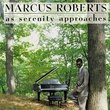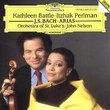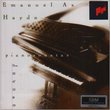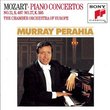| All Artists: Ilene Sameth, Peter Tiboris, Stella Zambalis Title: Beethoven: Symphony No. 9 [1895 Gustav Mahler Edition] Members Wishing: 0 Total Copies: 1 Label: Bridge Release Date: 9/11/1993 Genre: Classical Styles: Historical Periods, Classical (c.1770-1830), Symphonies Number of Discs: 1 SwapaCD Credits: 1 UPC: 090404903328 |
Search - Ilene Sameth, Peter Tiboris, Stella Zambalis :: Beethoven: Symphony No. 9 [1895 Gustav Mahler Edition]
![Beethoven: Symphony No. 9 [1895 Gustav Mahler Edition]](https://nationalbookswap.com/cd//l/83/1483/6001483.jpg) | Ilene Sameth, Peter Tiboris, Stella Zambalis Beethoven: Symphony No. 9 [1895 Gustav Mahler Edition] Genre: Classical
Mahler's grand expansion of Beethoven's Ninth Symphony employs an extra 4 horns and an extra set of Timpani, revoicing many passages of the venerable masterpiece. Mahler adds occasional counter-melodies and thickens the s... more » ![header=[] body=[This CD is available to be requested as disc only.]](/images/attributes/disc.png?v=a4e11020) ![header=[] body=[This CD is available to be requested with the disc and back insert.]](/images/attributes/disc_back.png?v=a4e11020) ![header=[] body=[This CD is available to be requested with the disc and front insert.]](/images/attributes/disc_front.png?v=a4e11020) ![header=[] body=[This CD is available to be requested with the disc, front and back inserts.]](/images/attributes/disc_front_back.png?v=a4e11020) |
Larger Image |
CD DetailsSynopsis
Album Description Mahler's grand expansion of Beethoven's Ninth Symphony employs an extra 4 horns and an extra set of Timpani, revoicing many passages of the venerable masterpiece. Mahler adds occasional counter-melodies and thickens the scoring in order to create his own heightened dynamic scale. Of his own performances of this re-scoring, Mahler wrote: "Far from following any arbitrary purpose or course, but also without allowing himself to be led astray by tradition, (this conductor) was constantly and solely concerned with carrying out Beethoven's wishes in their minutest detail, and ensuring that nothing the master intended should be sacrificed or drowned out amid the general confusion of sound." Similarly Requested CDs
|
CD ReviewsThe most moving... Eugene Reilly | VA, USA | 11/17/2000 (5 out of 5 stars) "I have both the Mahler edition of Beethovens 9th and two of Beethovens piece (each with a different conductor), and by far, the Mahler edition is the most moving and fantastic of the three. If you have Beethoven's 9th already, you must have the Mahler edition. I won't lecture on the differences/improvements Mahler made, though I must proclaim that this is the greatest of music I have heard in a long time." Norrington, eat your heart out! jerry i h | 03/09/2001 (5 out of 5 stars) "This version brings several questions to mind. What if Beethoven had not gone deaf before the first performance of his Ninth Symphony? What if Beethoven had Mahler's orchestra? Hopefully, this CD will attempt to answer that.Also, I have never been convinced by these so-called "period" recordings, where the conductors try to perform an "authentic" performance of this symphony. I find them too out-of-sync, if not out-of-date. Orchestras have changed since then, and so have concert halls. So I believe there is no such thing as an authentic performance. It's just how you look at it. I personally can't tell much difference in instrumentation, with the exception of the piano and timpani, which I think sound richer today. Beethoven might have had a different opinion if he had modern instruments.And finally, by all means, don't accept this CD as a substitute for the original version. I would recommend supplementing it with the 1961 recording by George Szell and the Cleveland Orchestra (Sony #46533)." Great listen medds | Hanover, NH United States | 05/01/2005 (5 out of 5 stars) "Tiboris's recording of Beethoven 9 with Mahler's "Retuschen" is a joy to listen to. I find it among the most satisfying recordings I know, especially in the finale. Not all of the details of the performance are consistent with the established research on Mahler's performing scores, and so it becomes difficult to sort out what changes are Mahler's, versus those of others who have used the score. Nevertheless, this recording makes the changes readily audible.
Particular changes of note: * Horns 5 & 6 double the bassons about 30 seconds into the scherzo. * The re-written opening of the finale, incorporating the expanded brass section and filling in notes unavailable to Beethoven's natural brass instruments. * The sequential entrances of woodwinds and brass during the first "Ode to Joy" theme, and the extensive re-orchestration of the section that immediately follows." |

 Track Listings (4) - Disc #1
Track Listings (4) - Disc #1








